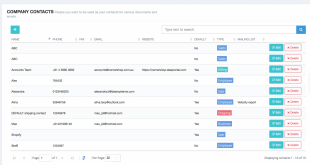Oracle NetSuite Overview: Uncover the transformative power of Oracle NetSuite, a cloud-based Enterprise Resource Planning (ERP) solution designed to streamline operations, enhance efficiency, and drive business growth. Explore the comprehensive suite of modules, pricing models, implementation strategies, customization options, and integration capabilities that empower businesses to achieve operational excellence and competitive advantage.
Oracle NetSuite Overview
Oracle NetSuite is a cloud-based business management software suite that helps businesses manage their operations more efficiently. It includes a wide range of features, including financial management, customer relationship management (CRM), inventory management, and e-commerce. NetSuite is designed to be scalable, so it can be used by businesses of all sizes.NetSuite
offers a number of key benefits, including:*
-*Improved efficiency
NetSuite can help businesses automate many of their tasks, which can free up time for more strategic initiatives.
-
-*Increased visibility
NetSuite provides businesses with a real-time view of their operations, which can help them make better decisions.
-*Improved collaboration
NetSuite can help businesses improve collaboration between different departments, which can lead to better outcomes.
-*Reduced costs
NetSuite can help businesses reduce costs by automating tasks and improving efficiency.
Many businesses have seen significant benefits from using NetSuite. For example, the clothing retailer Abercrombie & Fitch used NetSuite to improve its inventory management and reduce its costs. The manufacturing company Caterpillar used NetSuite to improve its customer service and increase its sales.
NetSuite Modules
NetSuite offers a comprehensive suite of integrated modules that cater to various business functions. These modules are designed to streamline operations, improve efficiency, and provide real-time visibility across the organization.
The following table provides an overview of the key modules available in NetSuite:
| Module Name | Description | Key Features | Benefits |
|---|---|---|---|
| Financial Management | Manages all financial transactions, including accounts payable, accounts receivable, cash flow, and financial reporting. |
|
|
| Enterprise Resource Planning (ERP) | Integrates core business processes, such as inventory management, order fulfillment, and project management. |
|
|
| Customer Relationship Management (CRM) | Manages customer interactions and relationships, including sales, marketing, and support. |
|
|
| Professional Services Automation (PSA) | Specifically designed for professional services firms, managing projects, billing, and time tracking. |
|
|
NetSuite Pricing
Oracle NetSuite offers flexible pricing models tailored to the specific needs of businesses. The pricing is influenced by several factors, including the number of users, modules used, and the industry in which the business operates.
There are three main pricing tiers for NetSuite:
- SuiteBasic: This is the most basic tier, designed for small businesses with up to 10 users. It includes core ERP functionality, such as financials, inventory management, and customer relationship management (CRM).
- SuiteMidMarket: This tier is designed for mid-sized businesses with up to 100 users. It includes all the features of SuiteBasic, plus additional functionality, such as advanced inventory management, project management, and e-commerce.
- SuiteEnterprise: This tier is designed for large businesses with over 100 users. It includes all the features of SuiteMidMarket, plus additional functionality, such as advanced financial management, supply chain management, and human capital management (HCM).
In addition to these three main pricing tiers, NetSuite also offers a variety of add-on modules that can be purchased separately. These modules include functionality such as professional services automation (PSA), revenue recognition, and fixed assets management.
NetSuite Implementation
Implementing NetSuite is a critical step towards realizing its full potential. It involves careful planning, data migration, and training to ensure a successful transition. Here’s a comprehensive overview of the implementation process:
Planning
- Define project scope and objectives
- Assemble a dedicated implementation team
- Establish a clear implementation timeline
- Identify and involve key stakeholders
Data Migration
Data migration is crucial for preserving existing data and ensuring continuity. It involves:
- Data extraction and cleansing
- Data mapping and transformation
- Data validation and testing
Training, Oracle netsuite overview
Training empowers users to leverage NetSuite effectively. It encompasses:
- End-user training on key functionalities
- Train-the-trainer programs for internal knowledge transfer
- Ongoing support and documentation
Tips for Success
- Plan thoroughly and engage stakeholders
- Prioritize data integrity and accuracy
- Invest in training and empower users
- Seek expert guidance when needed
- Monitor progress and make adjustments
NetSuite Customization: Oracle Netsuite Overview
![]()
NetSuite is a highly customizable cloud-based ERP system that can be tailored to meet the specific needs of any business. This flexibility makes it an ideal solution for businesses of all sizes, from startups to large enterprises.
There are a number of different ways to customize NetSuite, including:
SuiteScript
- SuiteScript is a JavaScript-based scripting language that allows developers to extend the functionality of NetSuite.
- With SuiteScript, developers can create custom scripts that can be used to automate tasks, integrate with other systems, and create custom reports.
SuiteFlow
- SuiteFlow is a visual workflow builder that allows users to create custom workflows without writing any code.
- With SuiteFlow, users can create workflows that automate business processes, such as order fulfillment, invoice processing, and customer support.
Businesses have used NetSuite customization to improve their operations in a number of ways, including:
- Automating tasks to save time and money.
- Integrating with other systems to streamline business processes.
- Creating custom reports to gain insights into their business.
- Improving customer service by providing personalized experiences.
NetSuite Integrations
NetSuite integration enables businesses to connect their NetSuite system with other business applications, creating a unified and streamlined business process. This integration helps eliminate data silos, automates tasks, and improves overall efficiency and productivity.
Types of NetSuite Integrations
NetSuite offers various types of integrations, including:
- ERP Integrations:Connect NetSuite with other ERP systems, such as SAP and Oracle E-Business Suite, to share data and automate processes across different business functions.
- CRM Integrations:Integrate NetSuite with CRM systems like Salesforce and Microsoft Dynamics 365 to manage customer relationships, track sales pipelines, and provide personalized customer experiences.
- E-commerce Integrations:Connect NetSuite with e-commerce platforms like Shopify and Magento to manage online orders, inventory, and customer data seamlessly.
- Other Integrations:NetSuite also integrates with various other applications, such as accounting software, project management tools, and marketing automation platforms, to enhance business functionality and streamline operations.
Benefits of NetSuite Integrations
NetSuite integrations offer numerous benefits to businesses, including:
- Improved Data Accuracy and Consistency:Integration eliminates manual data entry and reduces errors, ensuring data accuracy and consistency across all connected systems.
- Automated Processes:Integrations automate repetitive tasks, such as order processing, inventory updates, and customer communication, freeing up valuable time for more strategic initiatives.
- Enhanced Visibility and Control:Integrations provide a centralized view of business data, enabling managers to make informed decisions based on real-time information.
- Increased Productivity:Automated processes and streamlined workflows improve efficiency and productivity, allowing businesses to do more with less.
Ending Remarks
In conclusion, Oracle NetSuite Overview provides a comprehensive understanding of the benefits, capabilities, and value proposition of this leading ERP solution. By leveraging NetSuite’s robust features and tailored implementation, businesses can optimize their operations, gain real-time insights, and position themselves for sustainable growth in the ever-evolving business landscape.
Originally posted 2024-05-20 15:59:53.
 Bussines News Daily
Bussines News Daily


